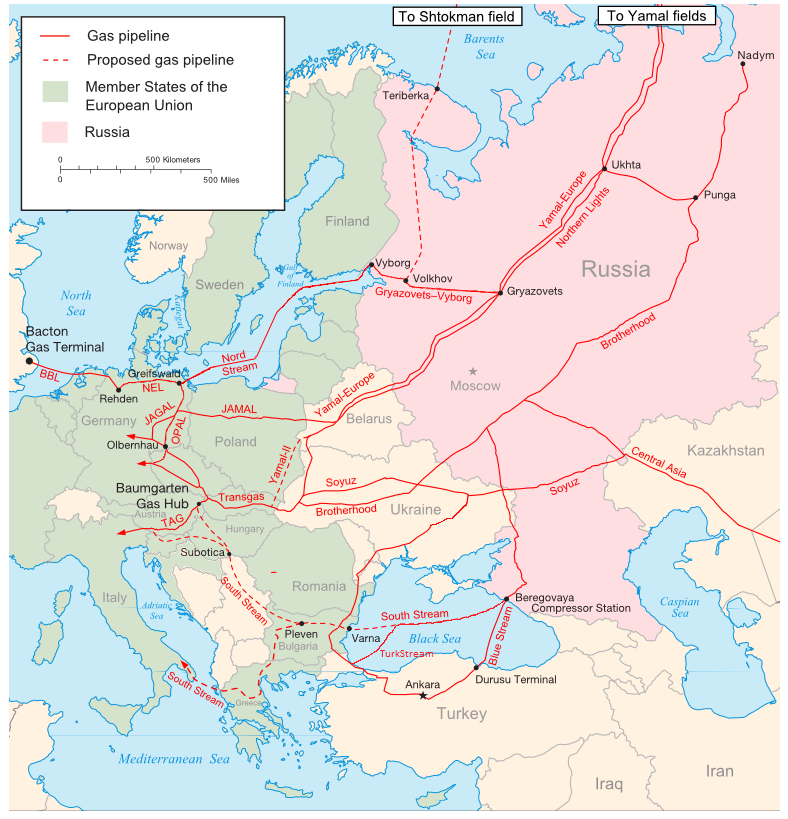Russia will dominate energy security until the grid is fit for renewables
Not only is Europe reliant on Russia for gas, but gas-fired power is critical for its electricity stability
Climate-driven reductions in Western oil & gas production risk exacerbating European dependence on Russian supplies
Renewables are the only route to energy and climate security, but they require a solution for grid stability, which Enoda delivers through dynamic harmonisation of electricity and green hydrogen
To understand the energy security implications of the war, let’s begin with a basic framework for understanding energy security. First, we can separate two types of energy security:
Physical energy security: Having access to physical energy supplies to meet our core human and economic needs.
Economic energy security: Having access to energy supplies at prices that are predictable and do not endanger our economic stability.
These two types of security manifest themselves in very different ways with respect to three different systems that power modern society: the oil system, the gas system and the electricity system.[1]
The three energy systems: Oil, gas and electricity
OIL
Although images of Middle Eastern oil fields on fire is what first comes to mind for many people when they hear “energy security”, in fact physical oil security is one of the most straightforward forms of energy security. Oil is easy to store and can be stored for long periods of time. While there are various grades of crudes, and some refineries can only process certain grades, the commodity is still highly fungible. A large, and flexible, seaborne trade means that we all live in one oil market, albeit one with distortions around the edges.
The challenge is economic security: oil markets are liquid and disruptions to supply in one area rapidly lead to price changes globally. Many commentators have made the argument that the US should not focus on the security of oil supplies from the Middle East because so little Middle Eastern oil actually goes to the US. While it is undoubtedly right that other nations should help bear the cost of global energy security, the key point is not whether the oil itself goes to the US, but rather that the global price impacts are felt in the US.
GAS
Gas is much more complicated. Most gas travels through pipelines, and storage is limited, regionally specific and expensive. Indeed, Europe’s largest storage capacity is in Ukraine. Whereas the oil in your car may have left the ground months ago before slowly making its way through refining and marketing, the gas in your boiler typically left the ground only a few days ago and has been on the move through the pipeline network ever since.
Figure 1: Europe's gas storage is limited and concentrated in a small number of countries, most importantly Ukraine
Note: Due to the war, no data is available for inventories in Ukraine’s storage.
Source: GIE Aggregated Gas Storage Inventory
Although there is international spot trade in LNG, the majority of LNG cargos are sold on long-term contracts – a longer supply chain, but not necessarily a more flexible one. As such, gas security is a regional affair, in which physical energy security is often as pressing a concern as economic security.
ELECTRICITY
Security and stability in the electricity system, in which all energy generators and users share a single AC waveform in real time, is even more complex than in the oil or the gas system. The system requires that key parameters be kept in narrow bands: a rise or fall in the system frequency of more than 1% can lead to blackouts. With storage options limited either by geography (e.g. pumped storage of water for hydropower) or cost (e.g. grid connected batteries), the electricity that we consume (literally, the electromotive force that we draw from the AC waveform) is generated as we consume it.
Furthermore, the shift away from coal and, in many places, nuclear energy over recent decades leaves the electricity system dependent on gas-fired generation for both primary power and system stability. This means that gas insecurity can easily manifest in the electricity system.
The climate transition risks exacerbating energy security problems
The climate transition is exacerbating these energy security problems. The world undoubtedly needs to move on from oil and gas to renewable energy to avoid climate change; this brings with it a real risk, due to both corporate decision making and government policy, that Western investment in and production of oil and gas will fall much faster than Western demand for it. Just as electrification is damaging electricity system stability, the collapse in energy investment leaves Western countries more reliant than ever on a small number of oil and gas producing countries and their national oil companies.
When it comes to European gas and, through the impact of gas-fired power stations, electricity security, this means reliance on Russia. Meanwhile, the Biden Administration’s climate-driven decisions to limit new gas leases, pipelines and LNG permits have limited the US’s ability to provide Europe with a democratic alternative to Russian natural gas.
Despite sanctions, Russia is likely to retain the upper hand in European energy security until we transition to 100% renewable energy
I have long argued that there are two fallacies in the European energy security debate. First, Russia’s need for security of demand does not give Europe power over Russia. Russia supplies c40% of European gas, and it can easily divide and conquer to ensure that there are sufficient European countries buying Russian gas to purchase that 40% of Russian gas. The carve out for natural gas in the SWIFT sanctions against Russia shows that Europeans expect to continue to buy Russian natural gas even as the crisis unfolds.
Figure 2: Russia has mulitple transportation options beyond Ukraine
Source: Samuel Bailey - Own work, CC BY 3.0
Second, money is much easier to store than natural gas. Before sanctions, Russia had plenty of foreign reserves with which to weather a disruption to gas revenues. The ruinous consequences of sanctions on the Russian central bank do not change the severe impact that losing Russian gas would have on Europe.
This paper from Bruegel surveys the cost and complexity of trying to replace Russian gas. Moreover, if the loss of Russian gas supplies impact Europe’s ability to fuel gas-fired power stations that provide frequency stability services, the economic and human consequences of electricity system outages could prove to be greater than the direct impact of gas insecurity.
Extreme energy sanctions would hurt Russia, but could reflect European desperation
Of course, Europe could decide to sanction Russian energy imports nonetheless. Some have suggested that sanctions should start with more easily replaced Russian oil, from which Russia earns four times more than it does from gas. Indeed, Europe’s willingness to, and cohesion in, sanctioning Russia has been unexpectedly strong. The US, its European allies and Japan are apparently already actively discussing the potential to ban Russian oil exports.
Nevertheless, Russia would likely use gas cut-offs to punish Europe for sanctions on its oil exports. Sanctions on Russian energy today could be perceived as a sign of desperation, and mostly likely the last option to contain Russia, short of war.
Energy security investments will accelerate globally, which requires building a stable, renewables-based energy system
The war in Ukraine clearly highlights the dangers of Europe’s exposure to Russian natural gas. Electrification will reduce, and perhaps eventually largely eliminate, Europe’s reliance on imported oil. However, if we do not address security of the natural gas system, and the electricity system’s dependence on natural gas, it will simply exacerbate exposure to Russian natural gas.
Coal is political and environmentally untenable. Nuclear is politically unpalatable in many places, unaffordable, and following Russia’s attack on the Zaporizhzhia, Europe's largest nuclear plant, an unacceptable security risk. The inflexibility of nuclear power station output also makes nuclear difficult to integrate with the variable demand of electric vehicles. I worry that many countries will sacrifice their climate goals to achieve security through a system that combines electrification of transport and coal-fired power. We do not have to do this. If Europe is going to achieve energy security, it will have to be through renewable electricity and fuels, like hydrogen, that can be produced locally with renewable electricity.
Building the renewable generation will be difficult, but doable. It will only deliver on its promise, however, if we operate it securely without the need for peaking gas-fired power stations to stabilise the network. The prize is a solution for grid stability that enables 100% renewable generation, a solution that Enoda delivers through dynamic harmonisation of electricity and green hydrogen.
[1] Some would say that we should now see hydrogen as a fourth energy system, but I argue that hydrogen is a mode of energy that will fill a variety of niches in the other systems.




